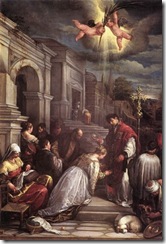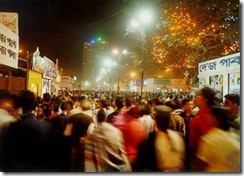[ad]
 I have consistently maintained that life, especially academic life, is getting the tougher as I tread my way forward in life. I passed my Secondary as a topper from a school which had about 350 students, and my batchmates numbered a mere 26. Of course, such a feat was no feat at all. Then I was off to St. Xavier’s, one of the premier colleges of the city, for my Higher Secondary. Toppers from all schools and students better than me by far crowded around me. While the real reason of my miserable performance in the next exam lay somewhere else, it cannot be boasted that I could have topped even if I had tried. And then to Jadavpur University. At each rung better and better students were selected, so that the competition became not just tough, but at times miserable and hopeless (for me, of course). Knowing my own limitations the most I could try for was a good show.
I have consistently maintained that life, especially academic life, is getting the tougher as I tread my way forward in life. I passed my Secondary as a topper from a school which had about 350 students, and my batchmates numbered a mere 26. Of course, such a feat was no feat at all. Then I was off to St. Xavier’s, one of the premier colleges of the city, for my Higher Secondary. Toppers from all schools and students better than me by far crowded around me. While the real reason of my miserable performance in the next exam lay somewhere else, it cannot be boasted that I could have topped even if I had tried. And then to Jadavpur University. At each rung better and better students were selected, so that the competition became not just tough, but at times miserable and hopeless (for me, of course). Knowing my own limitations the most I could try for was a good show.
However, this was only academics. Needless to say, in the existing job scenario in India, academics is the one salvation open to an aspirant. Sports, unless you make it big in Cricket (and which is very difficult, given that only eleven players are chosen out of a billion!) is a big no. Yet it gives an obvious satisfaction if one did well in sports and games. For all the cricket season my (almost) sole reason for going to college was cricket. Now that the cricket season is over I am considering switching over to some other game- say badminton. Ever since I can remember, I have liked sports and did well in all of them. Although I have never had technical training in any except badminton (that too for just a month), I caught on to a game very early and very well. And I am sure professional life would not see an exile from sports. In this mad race of getting good marks (the still madder race of getting a job lies a bit ahead) where the student’s life traverses from one class to another, from one library to another, the open ground works to open my mind, to clear my conceptions and priorities, and give confidence.
[ad]
![]()
I had heard of a certain Sports Day being organised annually in our University. Unfortunately none of us (my classmates) had seen it for ourselves, until this year, our fourth at the University. Strolling casually on that clear Monday (25 February 2002) I, Ajay and Amaru (two of my friends and classmates) registered our names for the shot-put throw event. We desperately wanted to run the sprints, but we did not have shorts or spike shoes, and hence had to settle only for the iron ball. I remembered Class X when I had won the shot-put gold for my House. That was six years ago. Could I repeat it again? But then that was in a small school where I was a reasonably strong guy. Now I was in an University where there were many stronger and bigger guys than me. Besides I did not have any training in the event, and relied on just brute force. We took a ball and went to the allotted space for the event and started throwing. I did almost as good as Ajay, which was creditworthy, given that he is a much stronger person. Even though I could not be confident of coming anywhere near the top, I fantasized that I had won the event. And then the actual event came (uptil now we had been practicing by ourselves). My first two throws were disqualified as I had crossed the line after my throw, the second time most foolishly. But I told myself that I had a third chance and I could win in just one good throw. And like a dream come true, I did.
I did not go to check how far I had thrown. As soon as the 16 pound (that’s my guess) iron ball dropped, the people around me proclaimed I had won. I just couldn’t believe myself. I had repeated what I had done six years back. That time too all were amazed at how far I had thrown the ball. This time too no one expected me to do any wonders. I was the true black horse. Later the distance was measured and I had thrown a good 8.74 metres (almost 29 feet). It was sweet. I told myself that if I could not win the gold in academics, I could do it in something else. The next evening I got my gold.
![]()
As I saw the people running the sprints, doing the high and long jumps, I was very miserable. I knew that if I had participated I would have won some medals- certainly in the hundred metres sprint. But unfortunately we did not have shorts, and some of the events passes by without our knowledge. We consoled ourselves that there’s one more year for us. We vowed that next year most of the medals should go the English Department. And I personally promised myself that I will win the Best Sportsman award for myself. Till next year….
Technorati Tags: Jadavpur University,Sports Day,Kolkata
[ad]

